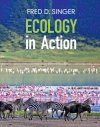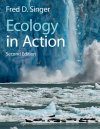![Ecology in Action Ecology in Action]()
Click to have a closer look
About this book
Contents
Customer reviews
Biography
Related titles
About this book
Taking a fresh approach to integrating key concepts and research processes, this undergraduate textbook encourages students to develop an understanding of how ecologists raise and answer real-world questions. Four unique chapters describe the development and evolution of different research programs in each of ecology's core areas, showing students that research is undertaken by real people who are profoundly influenced by their social and political environments. Beginning with a case study to capture student interest, each chapter emphasizes the linkage between observations, ideas, questions, hypotheses, predictions, results, and conclusions. Discussion questions, integrated within the text, encourage active participation, and a range of end-of-chapter questions reinforce knowledge and encourage application of analytical and critical thinking skills to real ecological questions. Students are asked to analyze and interpret real data, with support from online tutorials demonstrating the R programming language for statistical analysis.
Watch an introduction by Fred Singer below
Contents
Preface
Acknowledgements
Part I. Introduction and the Physical Environment:
1. What is ecology in action?
2. The physical environment
Part II: Evolutionary and Organismal Ecology:
3. Evolution and adaptation
4. Physiological and evolutionary ecology of acquiring nutrients and energy
5. Physiological and evolutionary ecology of temperature and water relations
6. Behavioral ecology
7. Bernd Heinrich – studying adaptation in the field and the laboratory
Part III. Population Ecology:
8. Life history evolution
9. Distribution and dispersal
10. Population abundance and growth
11. Conservation ecology
12. The chimpanzees of Gombe
Part IV. Community Ecology:
13. Interspecific competition
14. Predation and other exploitative interactions
15. Facilitation
16. Complex interactions and food webs
17. Biological diversity and community stability
18. Dan Janzen and Winnie Hallwachs – community interactions and tropical restoration through biodiversity conservation
Part V. Ecosystem and Global Ecology:
19. Ecosystem structure and energy flow
20. Nutrient cycles: global, regional and local
21. Disturbance and succession
22. Geographic and landscape ecology
23. The carbon cycle and climate change ecology
24. Jane Lubchenco – from the marine intertidal to global service
25. Epilogue
Glossary
References
Figure and quotation credits
Index
Customer Reviews
Biography
Fred D. Singer is Professor Emeritus of Biology at Radford University, where he began teaching in 1989. A committed teacher, he developed research programs on the behavioral and community ecology of spiders, dragonflies and zebrafish, while also collaborating with several colleagues to promote active learning as part of an ongoing research program on new approaches to teaching. In 2000, in recognition of his dual research programs, he was awarded the Radford Foundation Award for Creative Scholarship. He has taught approximately 20 different courses, including general ecology, field ecology and climate change ecology, using the philosophy that the best learning occurs when students deal with real experiments and real data.
Textbook
By: Fred D Singer(Author)
653 pages, 555 colour photos and colour illustrations, 88 colour tables
Advance praise:
"The textbook has a very logical approach, which actually matches the four main syllabus areas of my first year undergraduate course in ecology and evolution. The author says that he has read all the usual textbooks and that is evident. It is very refreshing to read a new textbook, rather than a new edition of an old textbook. The format is very engaging, particularly getting students to think about different types of exam questions at the end [...] The case studies bring the chapters to life, which contributes to making this a very interesting read; ecology textbooks can be theory-heavy, which makes them very dry. The structuring of chapters is very intuitive and builds on previous chapters, as a lecture course would. However, a chapter could be read out of order too as explanations are very clear."
– Judith Lock, University of Southampton
"Ecology in Action by Fred Singer was designed for ecology instructors who believe students learn best when they actively engage in thinking about and applying concepts. Basic theories are illuminated with stories about how particular ecologists developed research programs that helped solve environmental problems. Like many general ecology texts, this book emphasizes how to rigorously test hypotheses. Boxed inserts and a companion website provide concise instructions on how to use basic statistical procedures to answer questions. In contrast to most other science textbooks, however, Singer's book also emphasizes the roles of curiosity and careful observation in discovering hypotheses that are worth testing. This will be an ideal ecology text for anyone who would like to help students appreciate the excitement of scientific creativity."
– Robert Askins, Connecticut College
"Fred Singer's Ecology in Action is an excellent resource for students and young professionals seeking to fortify their knowledge of ecological science. In this book Dr. Singer provides a detailed overview of the foundations in ecology while he seamlessly incorporates an illuminating insight on how ecology is done. This is a welcome perspective in an ecological textbook since many contemporary titles heavily focus on abstract ecological concepts. Dr. Singer uses numerous ecological studies to guide the reader along paths of deductive reasoning, which results in a thorough understanding of ecology's many patterns and processes. With this approach he provides readers with a comprehensive overview of ecology, and with an accurate view of what is involved in conducting ecology. Considering the numerous review questions, critical thinking exercises, and online resources that this book provides, readers are assured to discover many exciting ideas in ecology."
– Joris van der Ham, George Mason University, Washington DC
"The text is written in a very student friendly manner. One that all students should enjoy reading to learn and understand the basics of ecology. Case studies incorporated into the text provide a much needed basis for the comprehension of difficult ecological concepts."
– Troy Ladine, East Texas Baptist University
"This book is a breath of fresh air. Singer has provided a clear and compelling text that will engage students at every level of knowledge. Students will find the text easy to read and the emphasis on research combined with ecological principles refreshing. The integrated questions and case studies provide excellent launch points for classroom discussion."
– Holly Porter-Morgan, City University of New York
"Having used most of the 'standard' general ecology textbooks at one time or another (along with a few not so standard ones), I'm excited by this book. It is refreshing and interesting with unique examples and clean artwork that make for a relatively engaging read that I believe most students will enjoy. The inclusion of an assortment of end of chapter questions (along with others embedded in the text) that run the gamut from application to data analysis will give students practice and insight into both critical thinking and quantitative skills that most books do not. The end of unit chapters about practicing ecologists are fascinating and unique in my experience and can only serve to interest students in how 'real science' occurs."
– Lynn Mahaffy, University of Delaware



































